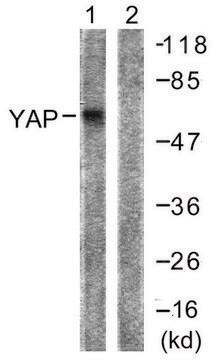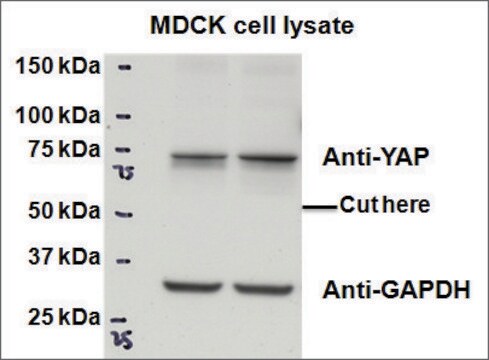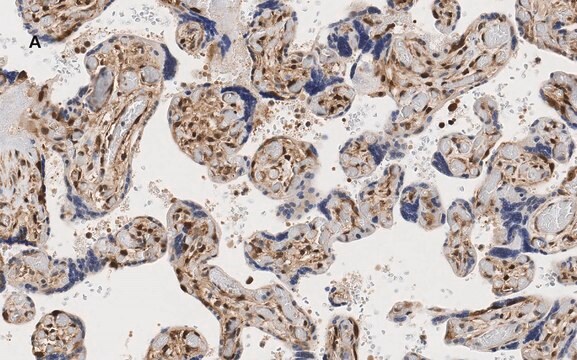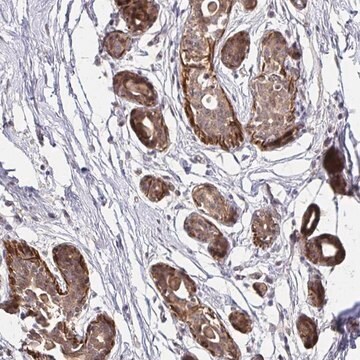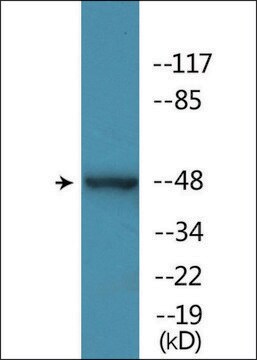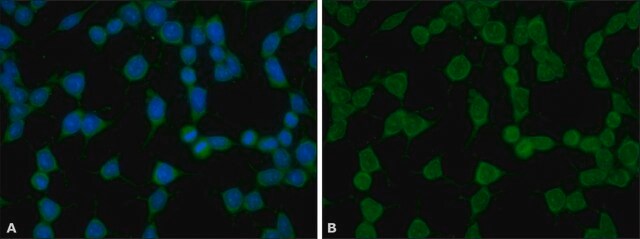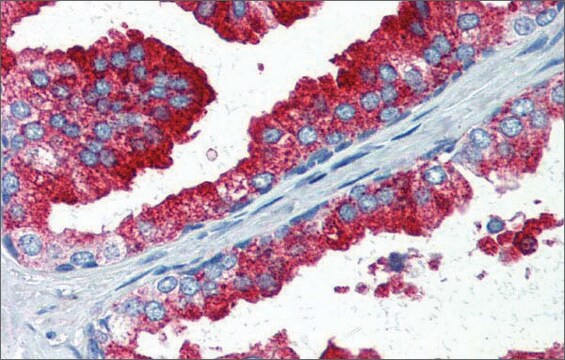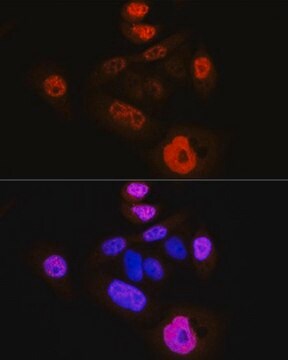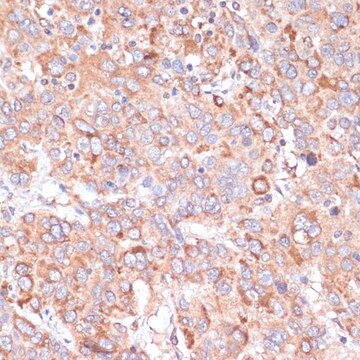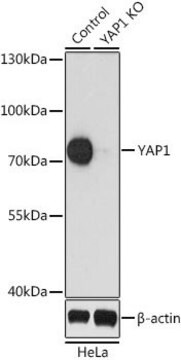추천 제품
생물학적 소스
rabbit
Quality Level
결합
unconjugated
항체 형태
affinity isolated antibody
항체 생산 유형
primary antibodies
클론
polyclonal
양식
buffered aqueous solution
분자량
antigen ~65 kDa
종 반응성
human
향상된 검증
recombinant expression
Learn more about Antibody Enhanced Validation
농도
~1 mg/mL
기술
western blot: 0.5-1 μg/mL using HEK-293T cells co-transfected with human YAP1 and c-Abl
UniProt 수납 번호
배송 상태
dry ice
저장 온도
−20°C
타겟 번역 후 변형
unmodified
유전자 정보
human ... YAP1(10413)
mouse ... Yap1(22601)
rat ... Yap1(363014)
일반 설명
YAP1 (Yes-associated protein 1, YAP, YAP2, YAP65) is a modular adaptor protein with multiple protein interaction domains, that is based on its interaction with Src-family tyrosine kinase c-Yes. It has a SH3-binding motif, proline-rich amino terminus, a WW domain, a coiled-coil and a PDZ-binding motif at the extreme C-terminus. YAP1 also contains a 14-3-3 interacting motif.
특이성
Anti-YAP1 (C-terminal) antibody is specific for human YAP1. The product is expected to react with mouse, bovine, and dog YAP1. In immunoblotting, detection of the YAP1 band is specifically inhibited with the immunizing peptide.
면역원
synthetic peptide corresponding to amino acids 442-454 located at the C-terminus of human YAP1. The sequence is identical in mouse, bovine, and dog YAP1.
애플리케이션
Anti-YAP1 (C-terminal) antibody is suitable for use in western blot (.5-1 μg/mL) using HEK-293T cells co-transfected with human YAP1 and c-Abl.
Applications in which this antibody has been used successfully, and the associated peer-reviewed papers, are given below.
Immunoprecipitation (1 paper)
Western Blotting (1 paper)
Immunoprecipitation (1 paper)
Western Blotting (1 paper)
생화학적/생리학적 작용
YAP1 (Yes-associated protein 1) induces p73-dependent apoptosis through the specific and selective co-activation of p53AIP1, an apoptotic p73 target gene. It stabilizes p73 by preventing Itch-mediated ubiquitination of p73. Upon phosphorylation by Akt at Ser127, 14-3-3 is recruited and stimulates YAP1 localization to the cytoplasm, resulting in loss of co-activator function in the nucleus. Inhibition of Akt potentiates the nuclear re-localization of YAP1 to promote apoptosis by p73.
YAP1 is a WW domain containing protein that functions as a transcriptional co-activator . It may also regulate p73 gene function in response to DNA damage. YAP1 is known to associate with a wide range of transcription factors . Alterations in YAP1 have been associated with tumor development .
물리적 형태
Solution in 0.01 M phosphate buffered saline, pH 7.4, and 15 mM sodium azide.
면책조항
Unless otherwise stated in our catalog or other company documentation accompanying the product(s), our products are intended for research use only and are not to be used for any other purpose, which includes but is not limited to, unauthorized commercial uses, in vitro diagnostic uses, ex vivo or in vivo therapeutic uses or any type of consumption or application to humans or animals.
적합한 제품을 찾을 수 없으신가요?
당사의 제품 선택기 도구.을(를) 시도해 보세요.
관련 제품
제품 번호
설명
가격
Storage Class Code
10 - Combustible liquids
WGK
WGK 3
Flash Point (°F)
Not applicable
Flash Point (°C)
Not applicable
개인 보호 장비
Eyeshields, Gloves, multi-purpose combination respirator cartridge (US)
The transcriptional coactivator Yes-associated protein drives p73 gene-target specificity in response to DNA Damage
Strano S, et al.
Molecular Cell, 18(4), 447-459 (2005)
Akt phosphorylates the Yes-associated protein, YAP, to induce interaction with 14-3-3 and attenuation of p73-mediated apoptosis
Basu S, et al.
Molecular Cell, 11(1), 11-23 (2003)
The Yes-associated protein 1 stabilizes p73 by preventing Itch-mediated ubiquitination of p73
Levy D, et al.
Cell Death and Differentiation, 14(4), 743-743 (2007)
Alexander von Gise et al.
Proceedings of the National Academy of Sciences of the United States of America, 109(7), 2394-2399 (2012-02-07)
Heart growth is tightly controlled so that the heart reaches a predetermined size. Fetal heart growth occurs through cardiomyocyte proliferation, whereas postnatal heart growth involves primarily physiological cardiomyocyte hypertrophy. The Hippo kinase cascade is an important regulator of organ growth.
Pingping Zhu et al.
Nature communications, 7, 13608-13608 (2016-12-03)
Liver cancer stem cells (CSCs) may contribute to the high rate of recurrence and heterogeneity of hepatocellular carcinoma (HCC). However, the biology of hepatic CSCs remains largely undefined. Through analysis of transcriptome microarray data, we identify a long noncoding RNA
자사의 과학자팀은 생명 과학, 재료 과학, 화학 합성, 크로마토그래피, 분석 및 기타 많은 영역을 포함한 모든 과학 분야에 경험이 있습니다..
고객지원팀으로 연락바랍니다.
